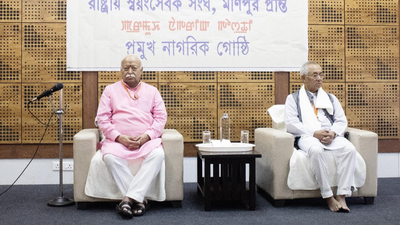NEW DELHI: Calling for long-term peace in Manipur, RSS Sarsanghchalak Mohan Bhagwat, in his first visit to the State on Thursday said stability in the state will require “patience, collective effort, and social discipline,” adding that “destruction takes minutes, but construction requires years, especially when done inclusively and without harming anyone.”Opening his three-day visit to Manipur with an address in Imphal, Bhagwat said efforts were underway at “community and societal level” to restore stability and stressed that responsibility could not rest with the government alone. “Awareness of the general public is the main factor. Everything should not be expected from the government, the responsibility of the society is very much required,” he said.He noted that the RSS was often discussed through “perceptions and propaganda,” and urged people to understand the organisation by observing its grassroots functioning. “There is no organisation comparable to the RSS, just as the sea, the sky, and the ocean have no comparison… To understand one has to visit Shakha,” he said, adding that the Sangh’s growth had been “organic” since its early years.

Recalling founder KB Hedgewar’s life and role in the freedom movement, Bhagwat said Hedgewar’s “realisation of the need for a united and qualitatively improved society led to the creation of the RSS.” He described the organisation as a “man-making methodology” and reiterated that its objective was to “organise the whole Hindu society including those who oppose the Sangh, not creating a power centre within the society.”Bhagwat said “Hindu” was a cultural and civilisational descriptor rather than a religious identity. Emphasising unity and social cohesion, he cited “Ekam Sat Vipra Bahudha Vadanti” and said diversity was “the manifestation of inherent unity within the society.”Outlining the RSS centenary-year “Panch Parivartan” initiatives – social harmony, family strengthening, environmental protection, swadeshi orientation and civic duty – he commended Manipur’s strong cultural traditions and encouraged their wider practice.Bhagwat added that strong social capital and skill development were essential for a self-reliant society, concluding with the Sangh’s long-standing ideal of “Sampoorna Samaj ka Sangathan by Sajjan Shakti.”




